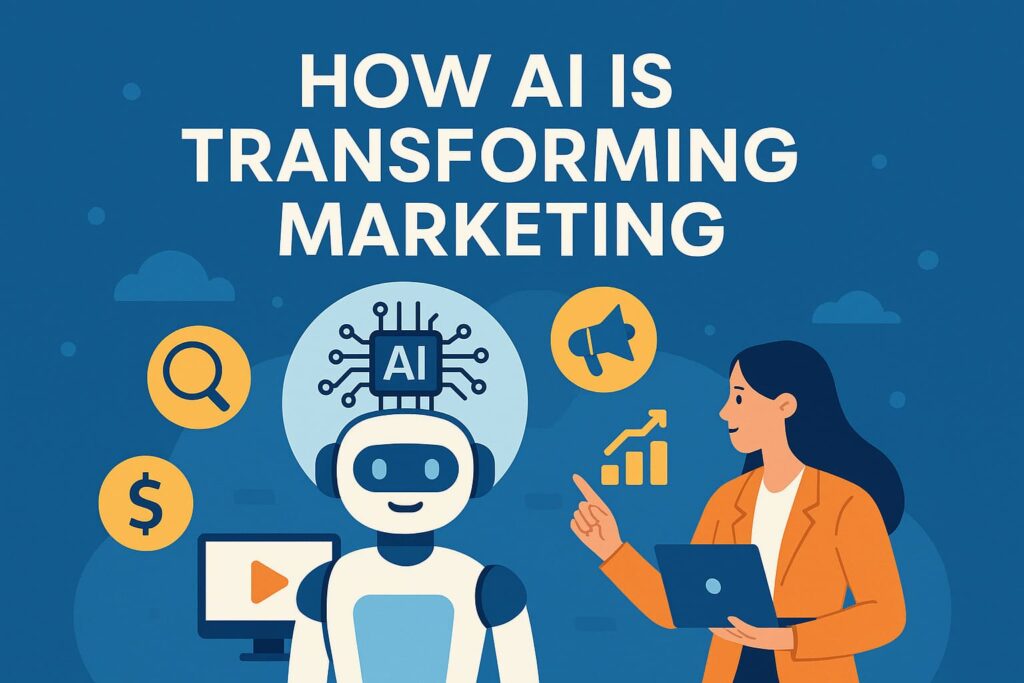Marketing has always evolved with technology. Radio, television, and the internet each changed how businesses reached people. In 2025, artificial intelligence (AI) is doing the same, but at a speed we have never seen before.
From AI powered chatbots to virtual influencers, AI is reshaping how brands connect with customers. What makes this different is scale. AI can analyze millions of data points, make predictions, and create personalized campaigns in seconds. For marketers, this means less guesswork and more precision.
Let’s break down the trends, benefits, challenges, and future of AI in marketing, and see why this technology is now at the heart of every major strategy.
Why AI Matters in Marketing
The goal of marketing is to connect the right audience with the right message at the perfect moment. Traditionally, this required large teams, research, and months of testing. AI compresses all of that into minutes.
For example, AI tools can:
- Analyze customer behavior by tracking browsing and buying patterns.
- Segment audiences based on actions rather than simple demographics.
- Predict outcomes such as which ad campaign will perform best.
- Personalize experiences by showing unique ads, product suggestions, or emails for every user.
In short, AI makes marketing smarter, faster, and more relevant.
Key AI Marketing Trends in 2025
1. Hyper Personalization
Personalization has been around for years, but AI takes it much further. Instead of just using a customer’s name in an email, AI can:
- Recommend products based on browsing history.
- Change website content depending on who is visiting.
- Adjust ad messaging in real time depending on user behavior.
For example, if you browse sneakers online, AI may show you running shoe ads in your size, combined with discounts that fit your shopping history. This makes the experience feel more like a personal shopping assistant than an advertisement.
2. Virtual Influencers and AI Avatars
In 2025, AI avatars are outperforming human salespeople in livestream shopping. Brands in China are leading this movement. AI powered hosts, sometimes called “virtual humans,” now sell products on platforms like TikTok Shop and Taobao around the clock.
Why are they effective?
- They never need breaks or sleep.
- They deliver consistent and brand approved messages.
- They respond instantly to audience questions using trained AI responses.
One real example is Brother, the printer company, which saw a 30 percent increase in sales after using an AI avatar host. What began as an experiment is quickly becoming a major global marketing trend.
3. Predictive Analytics
AI is excellent at prediction. By analyzing historical data, it can forecast customer behavior with surprising accuracy.
Practical uses include:
- Identifying customers most likely to buy.
- Detecting early signs of customer churn.
- Forecasting demand for seasonal products.
For example, Netflix uses predictive analytics to recommend shows that match your interests. Retailers use the same approach to suggest items before you even search for them. This results in fewer wasted ads and higher conversions.
4. Smarter Chatbots and Customer Support
Early chatbots were limited and often frustrating. In 2025, AI powered chatbots are natural and highly capable. They can:
- Understand conversational language.
- Handle complex customer queries.
- Upsell and cross sell products in real time.
- Operate across multiple platforms.
Imagine asking a chatbot, “What is the best phone under $500?” Instead of giving a generic reply, today’s AI bots can recommend specific models, share reviews, and even process the order. They not only reduce customer service costs but also increase sales.
5. AI in Content Creation
AI has become a partner in content creation. Marketers use it to:
- Draft blogs, articles, and ad copy.
- Generate social media posts and personalized emails.
- Produce multiple ad variations for A/B testing.
- Create videos, graphics, and product descriptions.
The key is speed. AI handles the heavy lifting, while humans refine tone and creativity. Together, this combination delivers content that is both fast and high quality.
Benefits of AI in Marketing
Saves Time and Resources
AI automates tasks such as audience segmentation, reporting, and campaign analysis. This allows teams to focus on creative strategy.
Improves Targeting Accuracy
Campaigns become more precise. Ads are shown to people most likely to engage, reducing wasted spend.
Boosts ROI
Smarter targeting and personalization lead to higher conversions and stronger returns on marketing budgets.
Enhances Customer Experience
AI delivers personalized and timely interactions, building trust and long term customer loyalty.
Challenges Marketers Face with AI
AI is powerful, but not without challenges:
- Data Privacy: Collecting and using customer data raises ethical and legal questions. Regulations such as GDPR must be followed carefully.
- Data Accuracy: AI relies on quality data. Poor or incomplete data leads to inaccurate predictions.
- Human Touch: Overuse of automation can make communication feel robotic. Balance is important.
- Costs: Some AI platforms and integrations are expensive, which may limit adoption for small businesses.
The Future of AI in Marketing
The next stage of AI in marketing looks even more advanced:
- Voice Search: Smart speakers are driving growth in voice based search. AI will play a role in optimizing brand visibility here.
- Visual Search: Platforms like Pinterest and Google Lens allow people to search with images. AI will make this more common in eCommerce.
- AR and VR Marketing: Augmented and virtual reality combined with AI will create immersive shopping and brand experiences.
- Emotional AI: New systems can analyze tone of voice, facial expressions, and text to tailor responses and ads based on emotional state.
Conclusion
AI is no longer optional in marketing. It has become a core tool for businesses that want to succeed in the digital space. In 2025, AI is driving personalization, prediction, and automation on a massive scale.
The future of marketing will depend on how well businesses balance the efficiency of AI with the authenticity of human creativity. Those who use AI to enhance rather than replace human effort will gain long term advantages.
Also read:




